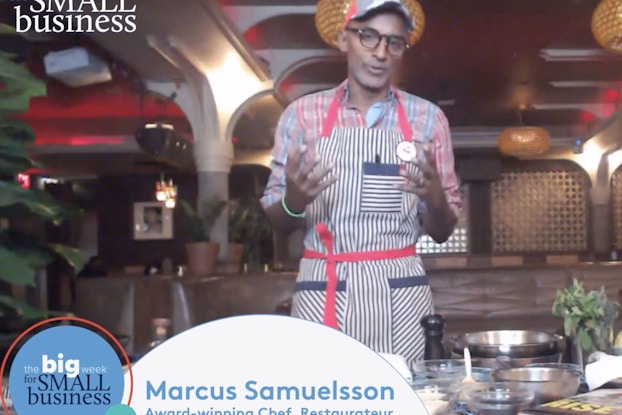If you were looking for the ideal background of an entrepreneur who could get through 2020 intact, you’d be hard-pressed to find one better than chef Marcus Samuelsson, an award-winning restaurateur, cookbook author, philanthropist and food activist.
Samuelsson was born in Ethiopia, raised in Sweden and later became a fixture of the United States’ culinary scene. He has opened many popular restaurants, been a guest chef at the White House and won “Top Chef Masters.” Given his diverse background, he’s overcome many challenges in his career and remains optimistic despite the pandemic’s hardships.
This week, Samuelsson spoke with CO— content director Jeanette Mulvey during The Big Week for Small Business event. Samuelsson and Mulvey discussed a wide variety of topics, including his childhood, storied career and how he views the unique challenges to restaurants during the pandemic.
Here are some highlights from the conversation.
How his upbringing influenced entrepreneurship
Samuelsson noted that he has “been an immigrant six times” in his life and said everything he’s done had left an impact, including experiences in his childhood in Sweden that would eventually inspire him to be a business owner.
“We were raised in a fishing village where true entrepreneurship happens all the time, with someone catching the fish, someone smoking it, someone cleaning nets, someone doing marketing to sell it,” Samuelsson said. “So, I was around seafood and entrepreneurship constantly. I also watched my father in the city, where he was a geologist and running a company … I got to view it in the culture at home, where some years were better and some were rough. All of that shapes me.”
The smartest choices in his career
Many choices led Samuelsson to his status as a prominent chef and thought leader, but he said that his decision to move to the United States was his smartest.
“As a black person, as imperfect as America is, it does provide a platform for people of color who are doing great things,” Samuelsson said. “Yes, we are going through a huge conversation about identity, but there are all kinds of backgrounds for entrepreneurs here and I needed to see that.”
His second smartest choice? Finding and embracing mentors.
“Mentors helped me like Leah Chase, who just passed away last year at 96 years old,” Samuelsson said. “She started her restaurant as a black lady in New Orleans in the ‘40s and 75-plus years later, her restaurant is still vibrant in that community. Looking at people like Ms. Leah Chase or my neighbor Sylvia Woods, you’re looking at family businesses that can go on for decades and decades. Being around greatness and having mentors really helped me and now allows me to mentor other chefs coming up.”
As a black person, as imperfect as America is, it does provide a platform for people of color who are doing great things.Marcus Samuelsson, award-winning restaurateur, cookbook author, philanthropist and food activist

On making mistakes to help you succeed
While not commenting on a specific mistake he’d made, Samuelsson did suggest there was a parallel between the process of making mistakes in food and entrepreneurship.
“As a chef, a lot of great dishes come out mistakes,” Samuelsson said. “That’s the non-linear path of creatives. All the dishes I came up with that weren’t as great and all of that risk-taking, something came out of it that was really great … I work in a creative field where you have to allow yourself to make mistakes. Risk-taking is part of hospitality.”
Why ‘trust is everything’ during COVID-19
Like many American restaurants, Samuelsson’s Red Rooster restaurant in Harlem has struggled to make ends meet. But Samuelsson continued to place trust in customers, partners and staff to get through the year.
“Trust is everything, especially in times of COVID,” Samuelsson said. “We all have to pivot as a country and as businesses, and trust is key … For us, it’s very important to make sure the customer is having a unique time and that the value prop matches the promise. If you’re going to leave your house now, it better be an experience. Otherwise, you’re not coming back.”
What restaurants need right now
Samuelsson noted that the COVID-19 pandemic had challenged restaurants greatly. But they also remain vital to our communities and still need help at the federal level.
“It’s been by far the toughest year in the hospitality industry,” Samuelsson said. “There are about 16 million people working in independent restaurants in America, and we have to hold onto those 16 million people. Because if restaurants are taken out of neighborhoods, all small retail is gone. That will impact unemployment and it will change the quality of life we have in our neighborhoods … We need [Congress] to pass the bill that’s in front of them. We’ve had a tough year, and I can’t put into words how challenging that’s been.”
CO— aims to bring you inspiration from leading respected experts. However, before making any business decision, you should consult a professional who can advise you based on your individual situation.
Follow us on Instagram for more expert tips & business owners stories.







